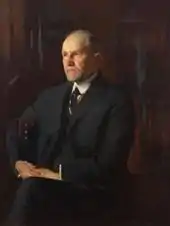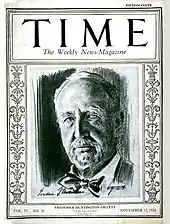Frederick H. Gillett
Frederick Huntington Gillett (/dʒɪˈlɛt/; October 16, 1851 – July 31, 1935) was an American politician who served as the 42nd Speaker of the United States House of Representatives from 1921 to 1925 and as a U.S. Senator from Massachusetts from 1925 to 1931. A Republican, Gillett first began his career in politics when he served in the Massachusetts House of Representatives from 1890-1891, and would go on to serve in the House from 1893-1925. At the time of his election, he was the oldest individual elected to a first term in the senate, a record that he would hold until Peter Welch's victory in the 2022 United States Senate election in Vermont 98 years later.
Frederick H. Gillett | |
|---|---|
 | |
| United States Senator from Massachusetts | |
| In office March 4, 1925 – March 3, 1931 | |
| Preceded by | David I. Walsh |
| Succeeded by | Marcus A. Coolidge |
| 37th Speaker of the United States House of Representatives | |
| In office December 5, 1923 – March 3, 1925 | |
| Preceded by | Champ Clark |
| Succeeded by | Nicholas Longworth |
| In office May 19, 1919 – December 3, 1923 | |
| Preceded by | multi-ballot election |
| Succeeded by | vacancy resolved |
| Leader of the House Republican Conference | |
| In office May 19, 1919 – March 3, 1925 | |
| Preceded by | James Robert Mann |
| Succeeded by | Nicholas Longworth |
| Member of the U.S. House of Representatives from Massachusetts's 2nd district | |
| In office March 4, 1893 – March 3, 1925 | |
| Preceded by | Elijah A. Morse |
| Succeeded by | George B. Churchill |
| Member of the Massachusetts House of Representatives | |
| In office 1890–1891 | |
| Personal details | |
| Born | Frederick Huntington Gillett October 16, 1851 Westfield, Massachusetts, U.S. |
| Died | July 31, 1935 (aged 83) Springfield, Massachusetts, U.S. |
| Resting place | Pine Hill Cemetery, Westfield, Massachusetts |
| Political party | Republican |
| Spouse | Christine Rice Hoar |
| Alma mater | Amherst College Harvard University |
| Profession | Lawyer |
Early life and education

Frederick H. Gillett was born in Westfield, Massachusetts, to Edward Bates Gillett (1817–1899) and Lucy Fowler Gillett (1830–1916). He graduated from Amherst College, where he was a member of the Alpha Delta Phi fraternity, in 1874 and Harvard Law School in 1877. He entered the practice of law in Springfield in 1877.[1]
Career

Gillett was the Assistant Attorney General of Massachusetts from 1879 to 1882. For two one-year terms he was a member of the Massachusetts House of Representatives. He was elected to the Fifty-third United States Congress in 1892.[2]
A Republican, Gillett served in the United States House of Representatives from 1893 to 1925.[3] On January 24, 1914, he introduced legislation to initiate the adoption of an Anti-Polygamy Amendment to the U.S. Constitution.[4]
Republicans gained a net total of 24 seats in the 1918 elections, increasing the size of their majority in the House. Gillett was nominated by the Republican caucus for Speaker of the House in the upcoming 66th United States Congress.[5] On May 19, 1919, Congress convened, and he was elected speaker, defeating the Democratic incumbent Champ Clark 228–172.[6] Gillett was expected to exercise less control than his predecessor, since he was characterized by one reporter as someone who did not drink coffee in the morning "for fear it would keep him awake all day".[7] He was reelected as speaker in 1921 and again in 1923.
In 1923, votes cast by the Progressive wing of the GOP resulted in multiple ballots as no Speaker candidate gained a majority. On the ninth ballot, after the Republican leadership agreed to Progressive procedural reforms, Gillet was eventually elected. This was the only time in the 20th century that the House failed to elect a Speaker during the first roll call,[8] and the 14th time in history that election of the Speaker required multiple ballots. The previous occurrence was in 1859 for the 36th Congress, which elected William Pennington after 44 ballots.[9] The next occurrence was in 2023 for the 118th Congress,[10] which elected Kevin McCarthy after 15 ballots.[11]
Gillett decided to run for the United States Senate in 1924. He won the Republican primary easily over two other candidates[12] and then narrowly defeated incumbent Senator David I. Walsh in the Republican landslide of November 1924 led by President Calvin Coolidge, a former governor of Massachusetts.[13] He was at the time the oldest person ever elected to a first term in the Senate, a record that would stand for 98 years.[14] Time magazine chose him for its November 17, 1924 cover.[15] He served one term in the Senate from 1925 to 1931, and decided not to seek re-election in the face of a difficult primary challenge.[16] In June 1930, he declined to state his position on prohibition or its repeal when queried by prohibition advocates.[17]
Personal life
On November 25, 1915, Gillett married Christine Rice Hoar, the widow of his former colleague in Congress, Rockwood Hoar.[18] In 1934, he published a biography of George Frisbie Hoar, an earlier congressman and senator from Massachusetts, and his wife's father-in-law from her previous marriage.[19]
During his time in Washington, Gillett spent his free time driving his 1926 Pontiac Coupe and playing golf in the morning. In retirement, he wintered in Pasadena, California. He died in a hospital in Springfield, Massachusetts, on July 31, 1935. Gillett was buried at Pine Hill Cemetery in Westfield.[1]
References
- "Bioguide Search". bioguide.congress.gov.
- "Gillett Dies at 83; A Former Senator" (PDF). The New York Times. July 31, 1935. Retrieved June 26, 2013.
- "S. Doc. 58-1 - Fifty-eighth Congress. (Extraordinary session -- beginning November 9, 1903.) Official Congressional Directory for the use of the United States Congress. Compiled under the direction of the Joint Committee on Printing by A.J. Halford. Special edition. Corrections made to November 5, 1903". GovInfo.gov. U.S. Government Printing Office. November 9, 1903. p. 48. Retrieved July 2, 2023.
- Iversen, Joan Smyth (1997). The Antipolygamy Controversy in U.S. Women's Movements: 1880 - 1925. New York: Routledge. p. 244. ISBN 9780815320791.
- "Gillett Chosen for Speakership of Next House" (PDF). The New York Times. February 28, 1919. Retrieved June 26, 2013.
- Glass, Andrew (May 19, 2010). "GOP assumes control of Congress, May 19, 1919". Politico. Retrieved July 9, 2019.
- Margulies, Herbert F. (1996). Reconciliation and Revival: James R. Mann and the House Republicans in the Wilson Era. Westport, Connecticut: Greenwood Press. pp. 191–8. ISBN 9780313298172.
- Heitshusen, Valerie; Beth, Richard S. (January 4, 2019). "Speakers of the House: Elections, 1913–2019" (PDF). CRS Report (RL30857). Washington, D.C.: Congressional Research Service. Retrieved July 9, 2019.
- "Speaker Elections Decided by Multiple Ballots". US House of Representatives: History, Art & Archives. Retrieved January 3, 2023.
- Andersen, Travis (January 3, 2023). "The last time a House speaker vote went to multiple ballots? It was 100 years ago, for Mass. Republican". The Boston Globe. Retrieved January 3, 2023 – via MSN.
- "Kevin McCarthy elected House Speaker, breaking historic deadlock". Washington Post. January 6, 2023. Retrieved January 7, 2023.
- "Gillett is Victor in Senate Contest; Couzens is Trailing" (PDF). The New York Times. September 10, 1924. Retrieved June 26, 2013.
- "Republicans Make Gains in Congress" (PDF). The New York Times. November 5, 1924. Retrieved June 26, 2013.
- Fedor, Lauren (January 2, 2023). "First-time senators take their seats as Democrats maintain slim majority". Financial Times. London. Retrieved June 15, 2023.
- "Frederick Gillett". Time. November 17, 1924. Archived from the original on November 6, 2007. Retrieved June 26, 2013.
- "Observations from Times Watch-Towers" (PDF). The New York Times. September 8, 1929. Retrieved June 26, 2013.
- "Women Taking Poll Say Many Senators Didge the Dry Issue" (PDF). The New York Times. June 9, 1930. Retrieved June 26, 2013.
- "Gillett-Hoar Wedding" (PDF). The New York Times. November 26, 1915. Retrieved June 26, 2013.
- "Senator Hoar" (PDF). The New York Times. December 16, 1934. Retrieved June 26, 2013.
External links
- Gillett Family Papers at the Amherst College Archives & Special Collections
- United States Congress. "Frederick H. Gillett (id: G000201)". Biographical Directory of the United States Congress.
- Rockwood Hoar Papers Archived 2007-10-24 at the Wayback Machine
- Westfield Athenaeum Archives



